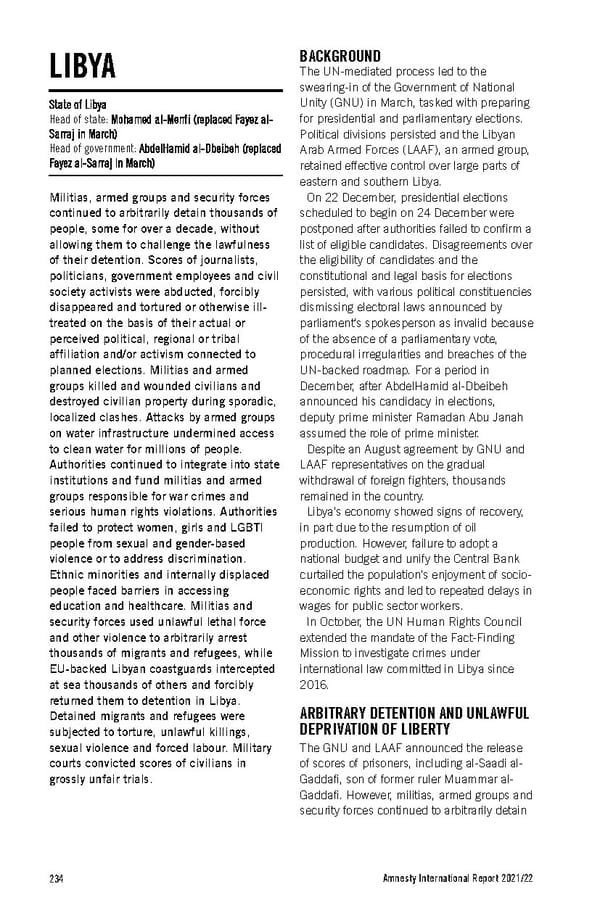BACKGROUND LIBYA The UN-mediated process led to the swearing-in of the Government of National State of Libya Unity (GNU) in March, tasked with preparing Head of state: Mohamed al-Menfi (replaced Fayez al- for presidential and parliamentary elections. Sarraj in March) Political divisions persisted and the Libyan Head of government: AbdelHamid al-Dbeibeh (replaced Arab Armed Forces (LAAF), an armed group, Fayez al-Sarraj in March) retained effective control over large parts of eastern and southern Libya. Militias, armed groups and security forces On 22 December, presidential elections continued to arbitrarily detain thousands of scheduled to begin on 24 December were people, some for over a decade, without postponed after authorities failed to confirm a allowing them to challenge the lawfulness list of eligible candidates. Disagreements over of their detention. Scores of journalists, the eligibility of candidates and the politicians, government employees and civil constitutional and legal basis for elections society activists were abducted, forcibly persisted, with various political constituencies disappeared and tortured or otherwise ill- dismissing electoral laws announced by treated on the basis of their actual or parliament’s spokesperson as invalid because perceived political, regional or tribal of the absence of a parliamentary vote, affiliation and/or activism connected to procedural irregularities and breaches of the planned elections. Militias and armed UN-backed roadmap. For a period in groups killed and wounded civilians and December, after AbdelHamid al-Dbeibeh destroyed civilian property during sporadic, announced his candidacy in elections, localized clashes. Attacks by armed groups deputy prime minister Ramadan Abu Janah on water infrastructure undermined access assumed the role of prime minister. to clean water for millions of people. Despite an August agreement by GNU and Authorities continued to integrate into state LAAF representatives on the gradual institutions and fund militias and armed withdrawal of foreign fighters, thousands groups responsible for war crimes and remained in the country. serious human rights violations. Authorities Libya’s economy showed signs of recovery, failed to protect women, girls and LGBTI in part due to the resumption of oil people from sexual and gender-based production. However, failure to adopt a violence or to address discrimination. national budget and unify the Central Bank Ethnic minorities and internally displaced curtailed the population’s enjoyment of socio- people faced barriers in accessing economic rights and led to repeated delays in education and healthcare. Militias and wages for public sector workers. security forces used unlawful lethal force In October, the UN Human Rights Council and other violence to arbitrarily arrest extended the mandate of the Fact-Finding thousands of migrants and refugees, while Mission to investigate crimes under EU-backed Libyan coastguards intercepted international law committed in Libya since at sea thousands of others and forcibly 2016. returned them to detention in Libya. ARBITRARY DETENTION AND UNLAWFUL Detained migrants and refugees were DEPRIVATION OF LIBERTY subjected to torture, unlawful killings, sexual violence and forced labour. Military The GNU and LAAF announced the release courts convicted scores of civilians in of scores of prisoners, including al-Saadi al- grossly unfair trials. Gaddafi, son of former ruler Muammar al- Gaddafi. However, militias, armed groups and security forces continued to arbitrarily detain Amnesty International Report 2021/22 234
 Amnesty International Report 2021/22 Page 233 Page 235
Amnesty International Report 2021/22 Page 233 Page 235